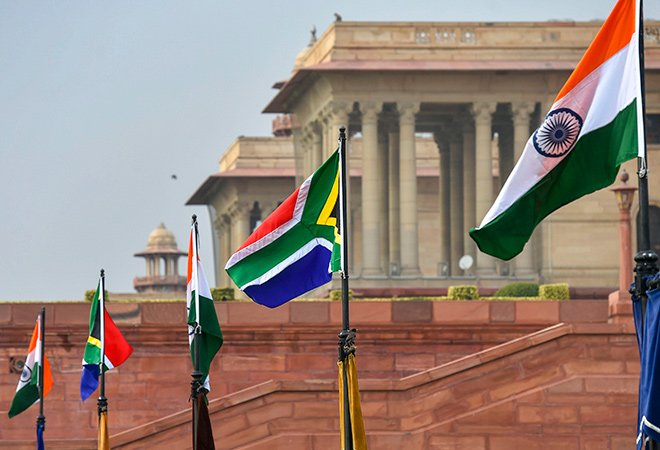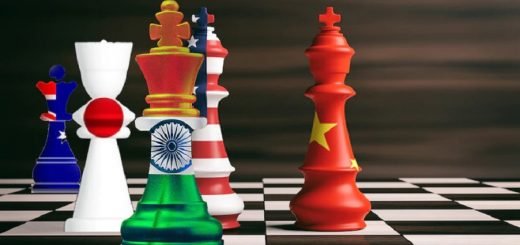Post-COVID World: India & South Africa

Anchored in the common ideals, ideas, interest and icons- like Mahatma Gandhi and Nelson Mandela, India-South Africa bilateral relations dates back to several centuries and is underpinned by significant historical, cultural, and economic linkages. The relationship is considered to be both fundamental and distinguished. The shared common experiences of colonialism, collective struggle against the apartheid regime, and the pursuit of non-alignment have largely shaped their world view, which is in consonance with each other.
With the Red Fort Declaration on strategic partnership, signed in March 1997 by then Prime Minister Deve Gowda and President Nelson Mandela, there has been a steady consolidation of close and friendly ties, both bilaterally and through various multilateral forums and the relationship has come to be characterised by the spirit of ‘developing together as equals.’
Notwithstanding historical complementaries, as the world battles the worst global crisis ever faced since World War II, India-South Africa relations have gained greater momentum. When power centres across the globe engaged in looking after their own interests, have shown traits of being inward in their orientation, India with its outward-looking approach, reflected in so-called “medical diplomacy” has reached to many, in dire need of medical assistance.
India’s approval for the export of 500,000 Hydroxychloroquine (restricted) tablets and two consignments of Paracetamol tablets to South Africa, followed by the telephonic conversation between Prime Minister Narendra Modi and President Cyril Ramaphosa, assuring India’s support to South Africa for maintaining essential medical supplies on 17th April underlines and reflects the deep understanding and strong bilateral relations that both the nations share. However, the momentum gained in relations needs to be sustained in order to fight the distress and difficulty that follows up the crisis.
Given the existence of broad potential and vast opportunities, commercial and economic relations between both the nations have continued to flourish since the establishment of diplomatic relations in 1993. These two significant emerging economies of the world with a strong history of understanding, sharing comparative advantage in labour and resource-intensive sector emanate immense promise for the future of the global marketplace. The already visible impact of COVID-19 on trade and economy evident from the reduction in demand, supply-chain disruptions and collapsed trade flows has underlined the resilience of production networks, whether regional or global and is symptomatic of the conservative inward-looking trade policy, which is most likely to follow. Writing in the Economic Times, Samir Saran, President, Observer Research Foundation and Jayant Sinha, Chairman of the Standing Committee on Finance in Indian Parliament have predicted a new phase of globalisation titled “gated globalisation”, where governments will ‘gate-keep’ flows of goods, services, finance and labour, when national strategic interests are at stake and nations may opt to trade with geographies and nations where political trust exists, this observation calls for the convergence of views at the apex level of political leadership, making rapport built over the period of time of decisive influence.

With the service sector as the key driver of both the economies, there is considerable potential for cooperation in Post-COVID world.
As people find new ways to work and communicate and sectors take their services online, this trend towards digitisation calls for cooperation in enhancing digital education, health, payments etc. The collective strength of demographic dividend and the rising threat of automation requires efficient capacity development programme and provide scope for cooperation on human resource development. As outlined by South Africa’s High Commissioner to India, Joel Sibusiso Ndeble in a recent interview to The Diplomatist, South Africa’s concern to change the structure of the trade relationship by exporting more manufactured goods to India needs to be addressed and interest of both the nations must be aligned.
Looking at the tourism dynamics, the large presence of the Indian population has meant substantial tourism and the volume of foreign tourists from South Africa has increased at a steady pace over the years. However, constraints like rising racist crimes against African tourists and lack of direct flights have hindered them in leveraging the full potential of the sector and strengthening people-to-people contact. Thus, an effective institutional mechanism in place to address the issue of racist crimes on foreign nationals and direct flights between both nations can be a good step going forward.
Bordering on the Indian Ocean, both regional powers are strategically placed in terms of ability to influence events in the region and thus prospect and potential of defence cooperation is substantive. The Western Indian Ocean region is a region of major global geostrategic and naval interaction and the secure maritime environment in the region is crucial for both the nations in securing their national interest. Greater emphasis on coordinated mechanism like the Indian Ocean Naval Symposium (IONS) for dialogue must be ensured.
The vast military-industrial complex of South Africa led by state-owned weapon manufacturer, Denel and other private defence manufacturers can be of significant gains by participating in ‘Make in India’ initiative, thereby, ensuring the flow of much needed foreign investment in the post-COVID world.

Considering global governance, India and South Africa share a similar world view of reform, just, equitable, and inclusive global order which reflects the contemporary realities of current political and economic power. South Africa being the strongest contender for a permanent seat on the UNSC from Africa continent and India’s relentless pursuit to attain the same, makes them natural partner on issues concerning global governance.
The Pandemic has resurfaced the concern over the retreat of multilateralism and the inability of global institutions in forging a global response to the global problem has only served the task of diminishing its credibility.
In such difficult times, India and South Africa collectively can play a greater role of reminding the world community of the value of multilateralism and the necessity to preserve it, with enhanced engagement in various multilateral groupings they share like BRICS, IBSA, IORA etc they can be better placed to resuscitate multilateralism. The success of IBSA Fund-supported key e-learning project to improve healthcare coverage and quality in the Northern Coastal region of Vietnam, which is now being used in response to COVID-19 reinforce the credentials of multilateralism and highlights the significant role that developing nations like ours despite inherent limitations can play in shaping the Post-COVID World. Thus, there is a need to enhance bilateral engagements through effective dialogue mechanism to align interests and allay differences in order to strengthen South-South cooperation and ensure peaceful, prosperous global order.
India-South Africa relationship characterised by the rich culture and people-to-people contacts have continued to be progressive and remains traditionally strong and friendly. A more result-oriented approach in bilateral dealings needs to be adopted in order to tap the unrealised vast potential that exists between both the countries.


















